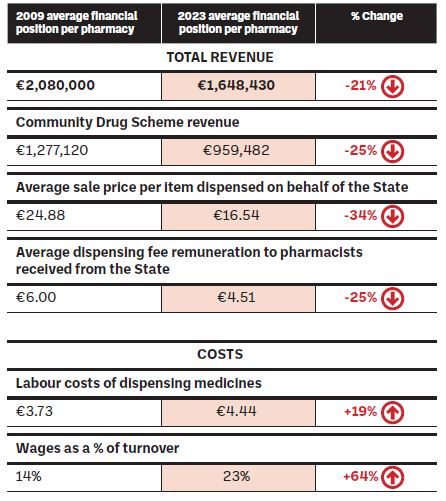Home » IPU Pre-Budget Submission 2025: an overview
As debates intensifies over Budget 2025, the IPU continues to ensure the needs of community pharmacy are heard in Government buildings. In this article, Jim Curran, IPU Director of Public Affairs and Communications, provides an overview of the key issues addressed in the IPU’s Pre-Budget Submission 2025, which was recently presented to the Minister for Finance, the Minister for Health and the Minister for Public Expenditure and Reform.

Community pharmacies in Ireland are vital to the healthcare system, providing essential services to local populations. However, they face significant financial challenges due to an outdated and regressive fee structure. Urgent reform is needed to safeguard community pharmacies, including a proposed flat fee of €6.50 per item dispensed and the reinstatement of the indexation link with the public sector pay process. This reform is critical for the economic viability of pharmacies, enabling them to manage ever-increasing costs and to continue, to offer vital healthcare services to their local communities.
Pharmacies have faced a pay freeze in dispensary remuneration since the Financial Emergency Measures in the Public Interest Act (FEMPI) 2009 and latterly the Public Service Pay and Pensions Act 2017. Since the end of the financial crisis, wages, salaries and administrative costs have significantly increased, particularly since 2019. This has created a challenging environment for pharmacies, especially those serving vulnerable and underserved populations.
In 2009, pharmacies received an average remuneration fee of €6 per item dispensed under community drug schemes. In 2023, an estimated 92 million items were dispensed, almost 25 million more than in 2009, but the average remuneration per item had decreased to €4.51. This significant erosion of dispensary fees over 16 years continues to threaten the financial viability of pharmacies.
The average financial position per pharmacy has deteriorated since 2009 due to reductions in community drug scheme turnover. Average wages have risen by 32.63 per cent during this period, significantly impacting the future viability of these pharmacies. The labour costs of dispensing a medicine item have increased from €3.73 to €4.44 in 2023, meaning only items with a dispensing fee of €5 (higher GMS dispensing fee) will cover labour costs, with little or no leeway to cover other costs.
Costs have also risen significantly in energy, utilities, rents, and insurance. During this period, the volume of medicines dispensed has increased by 34 per cent, supporting the argument that the decline in pharmacy revenues is due to a reduction in State reimbursement rather than a decline in demand. As demand increases, so do community pharmacy overheads, exacerbating their financial decline.
Figure 1: Financial position of pharmacies 2009 vs 2023
Reductions in community drug scheme revenues and increasing operational costs, particularly related to labour, have tightened margins causing strain for many pharmacies. According to the Fitzgerald Power report Annual Review of the Community Pharmacy Sector in Ireland 2023/24, approximately 10 per cent of pharmacies operate at a loss, and around 33 per cent have a margin below 10 per cent of turnover. Increasing costs exacerbate these financial pressures, including:
Community pharmacies in Ireland heavily rely on State dispensary remuneration compared to other business lines, such as private dispensing and retail sales. Despite efforts to diversify income streams, no alternative sources surpass revenues from State dispensary remuneration. The mixed financial performance of these alternative business lines underscores the sector’s reliance on State dispensing income, which has declined since 2009. Of the dispensing income, 82 per cent is generated through the community drug schemes, where both the remuneration and the price of the medicine are set by government.
Many pharmacies are now forced to rationalise service provision, reduce hours, and close on weekends to counteract the rising cost base. This is counterproductive to providing timely, accessible, patient-led professional services in a suitable environment. The deteriorating financial position must be adequately addressed to enable community pharmacies to deliver their maximum potential and reduce pressure on GP practices and Accident and Emergency Departments.
To safeguard the future economic viability of pharmacies, it is essential to recalibrate pharmacy dispensing remuneration to a flat rate of €6.50 per item dispensed and reinstate indexation to public pay. This proposal would increase total dispensing remuneration paid to pharmacists by €181 million.
It should be noted that every category of healthcare professional, including nurses, doctors, radiologists, and hospital pharmacists, as well as all other categories of employed workers, from caretakers and porters to hospital Chief Executives, have had their respective FEMPI measures reversed in one form or another. All public sector workers have received corrections, yet community pharmacy contractors have received no such correction to date.
GPs received fees totaling €668 million in 2022, compared to €357 million in 2009, an increase of 87 per cent. This substantial increase is a result of government reinvestment in their sector under the 2019 GP agreement.
Similar reinvestment in the pharmacy sector is crucial to ensure that community pharmacies can continue providing essential healthcare services.
The current regressive tiered fee payment structure is financially unsustainable. It undermines the ability of pharmacies to deliver quality healthcare. A shift to a flat fee structure is urgently needed to restore financial stability and maintain the provision of quality community healthcare.
An administration payment is crucial to address escalating costs and administrative burdens. This payment would help pharmacies manage rising costs more effectively, ensuring they can continue to provide essential healthcare services.
The IPU’s Pre-Budget Submission 2025 requests that budgetary provision be made to fund the following. This submission does not seek funding for new services, as the specifics of these services are currently unknown. Once we have clarity on these new services, we will be prepared to make a supplementary submission:
“Of the dispensing income, 82 per cent is generated through the community drug schemes, where both the remuneration and the price of the medicine are set by government.”
Community pharmacies derive approximately 60 per cent of their income from State payments for administering community drug schemes. This income has not increased over the last 16 years, while costs have continued to rise. Immediate action is necessary to restore dispensary remuneration to ensure the continued provision of essential healthcare services. Without such measures, the economic viability of community pharmacies, particularly smaller and rural ones, remains at significant risk.
There is a huge need for expanded pharmacy-based healthcare and community pharmacists have the expertise to deliver it, as evidenced by the COVID-19 vaccine programmes and access to emergency contraception. However, this expanded role will only be possible if pharmacy is put back on a sure financial footing
A copy of the full submission is available at ipu.ie.
Jim Curran

Director of Public Affairs and Communications, IPU
Highlighted Articles